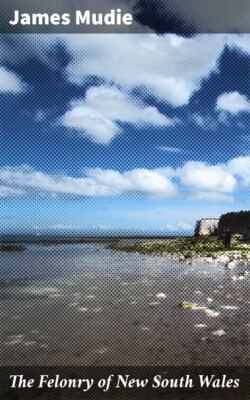Читать книгу The Felonry of New South Wales - James Mudie - Страница 3
На сайте Литреса книга снята с продажи.
INTRODUCTION.
ОглавлениеTable of Contents
THE object of the writer of the following pages is to lay before the British public, and more especially the legislature and the government, a faithful picture of the present state of New South Wales, as regards its social, moral, and political condition, particularly considering it as a penal settlement; with the tendency of the line of policy pursued by its present governor, Major-general Sir Richard Bourke, as to the treatment of the convict population and the entire felonry of the colony, and the mighty influence, either for good or evil, which the mode of treating the convicts must necessarily exercise over the interests and welfare of the free and reputable settlers,—over the morals of the entire community,—over the tranquillity of the colonial society,—and, emphatically, over the state of crime in Great Britain herself, whose criminals must be either emboldened or discouraged in proportion as they view transportation to a penal settlement as a punishment more or less severe.
The author has ventured to coin the word felonry, as the appellative of an order or class of persons in New South Wales,—an order which happily exists in no other country in the world. The major part of the inhabitants of the colony are felons now undergoing or felons who have already undergone their sentences. They occupy not only the station of the peasantry and labourers in other civilized communities, but many—very many—of them are also, as respects their wealth or their pursuits, in the condition of gentry, or of dealers, manufacturers, merchants, and lawyers or other members of the liberal professions. Hitherto there was no single term that could be employed to designate these various descriptions of persons, who now bear the denominations of "convicts" and "ticket-of-leave-men;" as also, "emancipists," (as they are absurdly enough called), who again are subdivided into "conditionally pardoned convicts," "fully pardoned convicts," and "expirees," or transported felons whose sentences have expired; together with "runaway convicts," subdivided into "absentees," (a name foolish for its mildness), and "bushrangers." The single term, the felonry (which comprehends all these descriptions of the criminal population), though new, is evidently a legitimate member of the tribe of appellatives distinguished by the same termination, as peasantry, tenantry, yeomanry, gentry, cavalry, chivalry, &c. The author has the honour of especially presenting it to the gentlemen emancipists, alias, the emancipated felons of the colony, by whom he has no doubt it will be received with most peculiar approbation and delight, inasmuch as it not only expresses—and elegantly expresses—their place in society, but as it raises their caste (with all the beauty and fashion of the felonry of New South Wales, whether sparkling in silks and jewels at the theatre and the ball, or dashing four-in-hand to the races at Parramatta, or over the glittering and crowded "drive" to Bellevue Point, on the South Head Road, not more romantic by the magnificence of its natural scenery than by the living splendours of its rich and animated felonry), to the dignity of an order in the commonwealth.
In gratulating himself, as well as the colony, on this felicitous invention, the author, before the fervor of critical accuracy and fastidiousness subsides, begs leave to record his protest against the abuse of language in the misapplication in the terms emancipists and absentees to two portions of the colonial felonry. An emancipist could not be understood to mean the emancipated, but the emancipator. Mr. Wilberforce may be honoured with the title of emancipist; but it is as absurd to give the same appellation to the emancipated felons of New South Wales as it would be to bestow it upon the emancipated negroes of the West Indies.
The ludicrous and affected philanthropy of the present governor of the colony, in advertising runaway convicts under the soft and gentle name of absentees, really unaccountable, unless we suppose it possible that his excellency, as a native of Ireland, and as having a strong and well-grounded Hibernian antipathy to his absentee countrymen, uses the term as one expressive both of the criminality of the absentee, and of his own abhorrence of the crime. To be serious, however, the calling runaway convicts, who must necessarily resort to the most desperate crimes,—always to robbery, and often to murder,—the calling these ruffians by the name which is used to designate the nonresident nobility and gentry of Ireland, is much worse than merely ridiculous. It can serve but one good end; and that is, to prepare the reader for the exposure of the convict-propensities of the present colonial government, which it is the principal design of this volume to accomplish.
